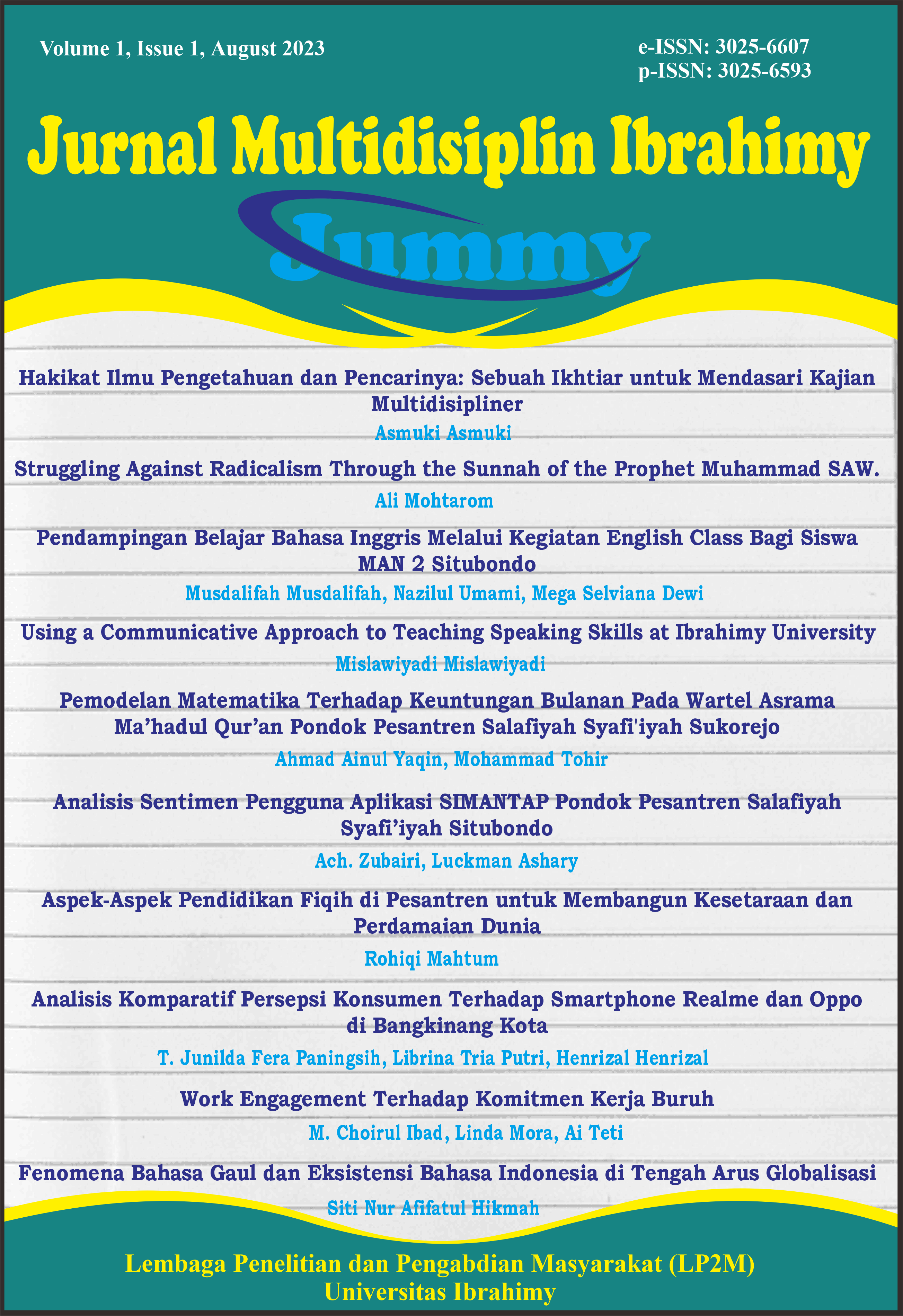Struggling Against Radicalism Through the Sunnah of the Prophet Muhammad SAW.
DOI:
https://doi.org/10.35316/jummy.v1i1.3496Keywords:
Struggling, Against Radicalism, Sunnah, HadithAbstract
Citing a hadith from the Prophet Muhammad SAW, this essay discusses how radicalism is handled in Indonesia as an extremist and terrorist problem. Using the Integrative Review paradigm, it uses a qualitative approach and literature review as its research technique. The Hadith of the Prophet provides two strategies: preventative activity and repressive action. Promoting attitudes of moderation, tolerance, compassion, justice, equality, and prudence while issuing fatwas are examples of preventive efforts. Repressive measures, on the other hand, are meant to deal with hypocrites and Khawarij to preserve the Muslim Ummah's unity and defend the Muslim community's wellbeing per the hadith recorded in Sahih Bukhari and Sahih Muslim.
References
Abu-Nimer, M., & Smith, R. K. (2016). Interreligious and intercultural education for dialogue, peace and social cohesion. In International Review of Education (Vol. 62, pp. 393–405). Springer.
Afzal, S., Iqbal, H., & Inayay, M. (2012). Terrorism and extremism as a non-traditional security threat post 9/11: Implications for Pakistan’s security. International Journal of Business and Social Science, 3(24), 194–203.
Antúnez, J. C., & Tellidis, I. (2016). The power of words: the deficient terminology surrounding Islam-related terrorism. In Terrorism: Bridging the Gap with Peace and Conflict Studies (pp. 118–139). Routledge.
Ash-Shallabi, A. M. (2013). Biografi utsman bin Affan. Pustaka Al-Kautsar.
Bargh, J. A., McKenna, K. Y. A., & Fitzsimons, G. M. (2002). Can you see the real me? Activation and expression of the “true self” on the Internet. Journal of Social Issues, 58(1), 33–48.
Ben-Dor, G. (2013). The uniqueness of Islamic fundamentalism. In Religious radicalism in the greater Middle East (pp. 239–252). Routledge.
Borum, R. (2011). Radicalization into violent extremism I: A review of social science theories. Journal of Strategic Security, 4(4), 7–36.
Bramadat, P., & Dawson, L. (2014). Religious radicalization and securitization in Canada and beyond. University of Toronto Press.
Dickinson, H. T. (2016). The politics of the people in eighteenth-century Britain. Springer.
Djamba, Y. K. (2002). Social research methods: Qualitative and quantitative approaches. Teaching Sociology, 30(3), 380.
Farooq, M. O. (2020). Muhammad Ibn Abdul Wahhab’s Kitab at-Tauhid: Nature, Scope and Impact. Scope and Impact (May 1, 2020).
Gedicks, F. M. (2017). “ Substantial” Burdens: How Courts May (and Why They Must) Judge Burdens on Religion Under RFRA. Geo. Wash. L. Rev., 85, 94.
Gunaratna, R., Bin, M. F., & Hassan, M. (2011). Terrorist rehabilitation: the Singapore experience. In Terrorist Rehabilitation and Counter-Radicalisation (pp. 36–58). Routledge.
Haleem, M. A. S. A. (2018). The role of context in interpreting and translating the Qur’an. Journal of Qur’anic Studies, 20(1), 47–66.
Hasbi, M. (2021). The Exploring Between Theological Thinking And Education On Abd. Qahhar Mudzakkar. Turkish Journal of Computer and Mathematics Education (TURCOMAT), 12(7), 2979–2995.
Hidayat, S. (2022). Kontekstualisasi Ayat-Ayat Jihad Menurut Yusuf Al-Qaradlawi. Institut PTIQ Jakarta.
Irvansyah, I. (2017). Relevansi enam nasehat menuntut ilmu dalam pendidikan perspektif Imam Syafi’i dalam Kitab Diwan. IAIN Palangka Raya.
Ismail, A. M., Mujani, W. K., & AM, A. A. Z. (2018). Methods of Da’wah and Social Networks in Dealing with Liberalism and Extremism. Islamiyyat: International Journal of Islamic Studies, 40(2).
Juergensmeyer, M. (2017). Terror in the mind of God: The global rise of religious violence (Vol. 13). Univ of California Press.
Khamdan, M., & Wiharyani, W. (2018). Islam Nusantara in Political Contestation Identity Religion in Indonesia. Addin, 12(2), 491–520.
Lefèvre, R. (2013). Ashes of Hama: The Muslim Brotherhood in Syria. Oxford University Press, USA.
Mardiah, M., & Napratilora, M. (2021). Konsep Pendidikan Karakter Dalam Al-Qur’an Dan Hadits. Al-Liqo: Jurnal Pendidikan Islam, 6(2), 108–130.
Napoleon, V., & Friedland, H. (2014). Indigenous legal traditions: Roots to renaissance. The Oxford Handbook of Criminal Law, 225–247.
Nasution, S. F. (2021). Pemahaman Bid’ah Menurut Ulama di Desa Teluk Pulai Dalam Kecamatan Kualuh Leidong. Hijaz: Jurnal Ilmu-Ilmu Keislaman, 1(2), 105–110.
Nirenberg, D. (2015). Communities of violence: Persecution of minorities in the middle ages-updated edition. Princeton University Press.
Nurjaman, A. R. (2020). Pendidikan Agama Islam. Bumi Aksara.
Padgett, J. F., Prajda, K., Rohr, B., & Schoots, J. (2020). Political discussion and debate in narrative time: The Florentine Consulte e Pratiche, 1376–1378. Poetics, 78(1), 101377.
Powell, C. (2013). Radical relationism: A proposal. In Conceptualizing relational sociology: Ontological and theoretical issues (pp. 187–207). Springer.
Rahmadi, R., & Hamdan, H. (2023). Religious Moderation in The Perspective Of Islamic Education Multidisciplinary and Its Implementation in The Institution of Islamic Education in Indonesia. Khazanah: Jurnal Studi Islam Dan Humaniora, 21(1), 59–82.
Rahman, M. T., & Mufti, M. (2021). Massification of youth religious studies to prevent juvenile delinquency in Bandung. HTS Teologiese Studies/Theological Studies, 77(4).
Saefullah, H. (2017). ‘Nevermind the jahiliyyah, here’s the hijrahs’: Punk and the religious turn in the contemporary Indonesian underground scene. Punk & Post-Punk, 6(2), 263–289.
Sandberg, S., & Andersen, J. C. (2019). Opposing violent extremism through counternarratives: Four forms of narrative resistance. In The emerald handbook of narrative criminology (pp. 445–466). Emerald Publishing Limited.
Strosahl, K. D., Robinson, P. J., & Gustavsson, T. (2012). Brief interventions for radical change: Principles and practice of focused acceptance and commitment therapy. New Harbinger Publications.
Syaripudin, S. (2018). Principles of moderation in Islamic politics. Ri’ayah: Jurnal Sosial Dan Keagamaan, 3(1), 31–43.
Turfe, T. A. (2015). Know and Follow the Straight Path: Finding Common Ground between Sunnis and Shi’as. iUniverse.
Wiktorowicz, Q., & Kaltner, J. (2017). Killing in the name of Islam: Al-Qaeda’s justification for September 11. In Insurgent Terrorism (pp. 417–433). Routledge.
Yusuf, F. (2016). Larangan Visualisasi Dalam Konteks Gambar Nabi Muhammad SAW Studi Analisis Hadis Dan Historis.
Zuhdi, M. H. (2014). Konsep kepemimpinan dalam perspektif Islam. AKADEMIKA: Jurnal Pemikiran Islam, 19(1), 35–57.
Downloads
Published
How to Cite
Issue
Section
License












_by_Matematohir.jpg)


